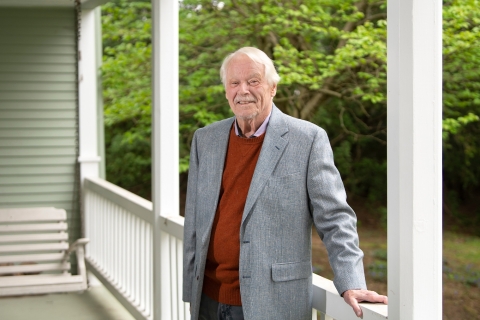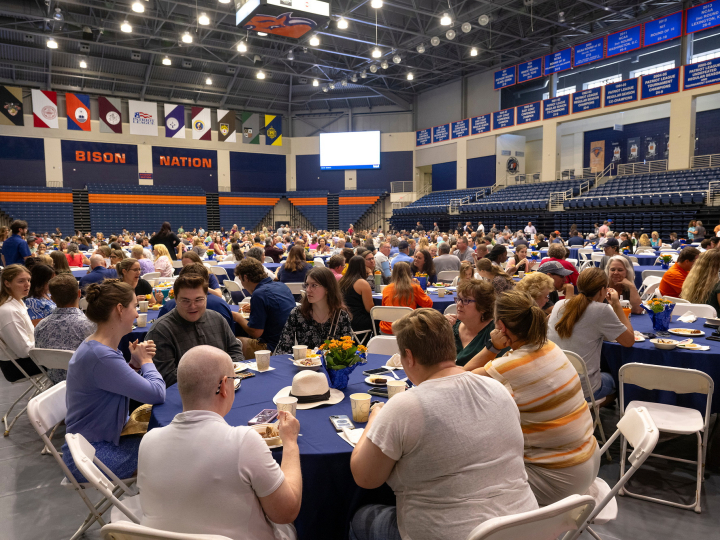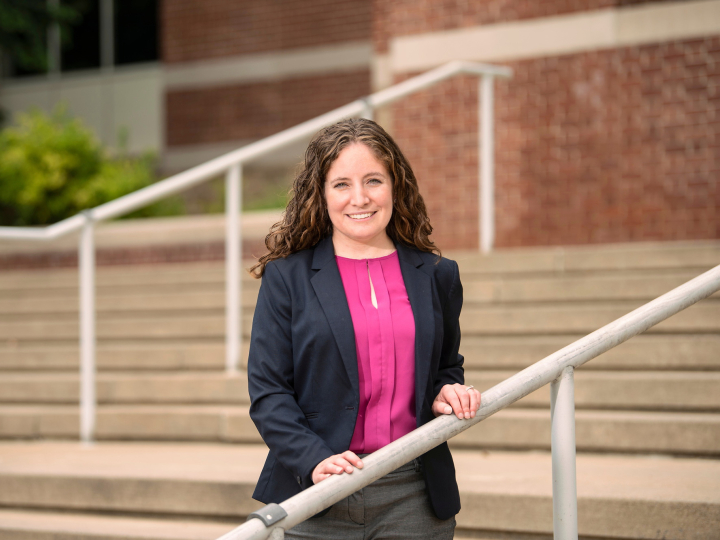
Gift to Honor Bucknell Mentor Benefits Many
April 21, 2021
A gift from Glen Tullman '81 will enhance transformational learning experiences and advance Bucknell’s mission of engaging with the region. Photo by David Alexander
In a transformative educational experience, a professor plants a seed in the mind of a student — a seed that may take many years to fully flower. Psychology and Animal Behavior Professor Douglas Candland planted a seed in his student, Glen Tullman '81, and continued for the next 40 years to nurture that seed. Now Tullman is honoring that enduring relationship with a major gift of $6 million to Bucknell University.
The gift will be apportioned in three areas of need: $3 million to endow a discretionary fund for the newly named Douglas K. Candland Dean of the College of Arts & Sciences, which will support high-impact educational activities in the college. A second portion, $2.5 million, creates the Douglas K. Candland Fund for Civic Action to honor the professor's years of service as a teacher, scholar and mentor. Income from the fund supports civic and community-engaged learning activities. Bucknell's Animal Behavior Program, one of the premier programs of its kind in the country, was founded by Candland in 1968 and will receive $500,000 to endow ongoing costs of operating its animal-care facility.
A Health Care Entrepreneur
Tullman is a Chicago-based health care services entrepreneur who has founded several companies. The latest, Transcarent, was launched in March. It will, he says, "create a new and different kind of health care experience that puts people back in charge of their care."
His emphasis on creating equity in the health care sphere was inspired by Candland after Tullman sold his first company, 10 years after graduation. He had returned to Bucknell to speak about entrepreneurship, and afterward, he says, Candland approached him.
"He said, 'How do you think you're doing?' I said, 'I think I'm doing really well.' Doug said, 'I don't think you're doing so well.' I was kind of in shock. I asked, 'Why not?,' and he said, ‘Well, we didn't educate you to make money; we educated you to make a difference. I don't think you're doing that."
From that point on, Tullman made helping other people a guiding principle of his companies.
Transformative On and Off Campus
Tullman's gift to Bucknell will help many people — students, faculty and staff as well as residents of the surrounding communities.
"The gift to the dean will support and accelerate what makes Bucknell special," says Provost Elisabeth Mermann-Jozwiak. "This includes," she says, "high-impact educational practices that are proven to lead to student success and that are especially valuable to students of color through the faculty-student mentorship relationships that they offer."

The gift creates several funds named for Professor Douglas Candland, psychology and animal behavior. Photo by Emily Paine
She also noted that "very few universities have funds to support humanities programs through undergraduate research; Bucknell strives to do so. This will make us even more attractive to students seeking out these transformational experiences that set students up for success in their future careers."
Karl Voss, dean of the College of Arts & Sciences who will serve as the inaugural Candland Dean, says, "I look forward to conceiving programs that will enable us to cultivate the sort of enriching faculty/student relationships that Glen and Doug embody. The naming of this gift for Doug is a way of recognizing the craft of teaching.
"This gift will allow us to move forward with programming and activities that make a significant difference in the educational experiences of Bucknell students and that will encourage the kind of relationships Glen and Doug have benefited from and enjoyed for so many years. The naming of this gift for Doug is a remarkable form of recognition for a faculty member whose career has had a broad and positive impact on the Bucknell community."
A Civically Engaged Campus
The second area of support is civic engagement.
"This gift will also help us in our efforts of gaining national recognition as a civically engaged campus — a Carnegie classification that we strive to attain," Mermann-Jozwiak says.
Katherine Faull, professor of German and comparative humanities, is the faculty director of the Engaged Bucknell initiative. Faull says the goal is perfectly timed to align with the goals of the Plan for Bucknell 2025.
"One goal of our strategic plan is educating students for informed and engaged citizenship in a local and global context," she says. "This gift will really help us work toward fulfilling those strategies."
The University's diversity, equity and inclusion efforts will also be enhanced through support from the gift.
To Candland, who retired from Bucknell in 2002 after 42 years of teaching, the civic engagement opportunities are meaningful both for the community members who benefit and the students who serve.
"This is a very resource-rich area, and students have much to learn about America that they would not learn in a big-city school. We're teaching students about the great breadth and depth of how Americans live."
Tullman is a good example of a student from suburbia who benefited from learning about other cultures. He met an Amish family while attending Bucknell and, 40 years later, he still visits the family when he comes to Lewisburg.
Support for Animal Behavior Lab
Candland is also pleased that the gift provides a fixed endowment to support the Animal Behavior Lab, a 24/7 operation with four species of primates in residence. "It's the way education should be — a community of people from first year to fourth year who are engaged in studying animal behavior," he says. "They're also talking about their other courses, about issues of the day. It has a wonderful feel to it. Lucky is the kid who walks in and becomes part of it."
One of those kids 40 years ago was Tullman, who took three courses from Candland — introductory psychology and animal behavior as well as a special course in writing, which has been helpful in his business career.
Experiencing the Liberal Arts
"Bucknell gave me an opportunity to truly experience the liberal arts, so I was able to take a variety of courses in a variety of areas to see what my interests were," says Tullman, who majored in economics. "I spent a fair amount of time over at the primate colony, and that led to all kinds of interesting, fun things."
Tullman is excited about the opportunities the gift will open up for more students to have more of those diverse and engaging educational experiences.
"This gift in Doug's honor will lead to more people having a broader education to solve big problems and will encourage more educators to do what Doug has done, which is invest his life in developing people who can make a difference," he says.
"There's a great quote that says something like, 'Education is like a time bomb. You light the fuse, and you don't know for 50 years what exactly is going to happen,' " Tullman adds. "These are long-term education investments that we have to make and that Doug has made. This gift is about the impact that one amazing person has had."

